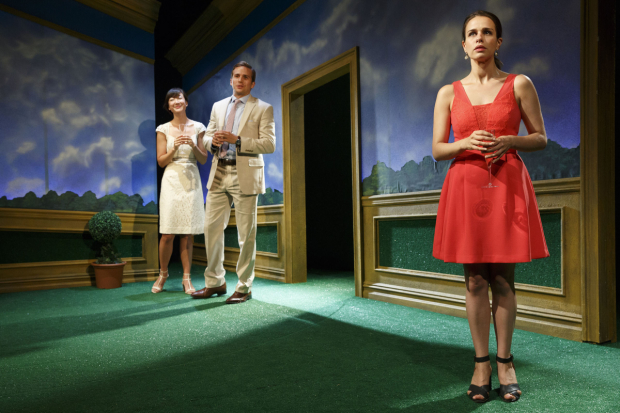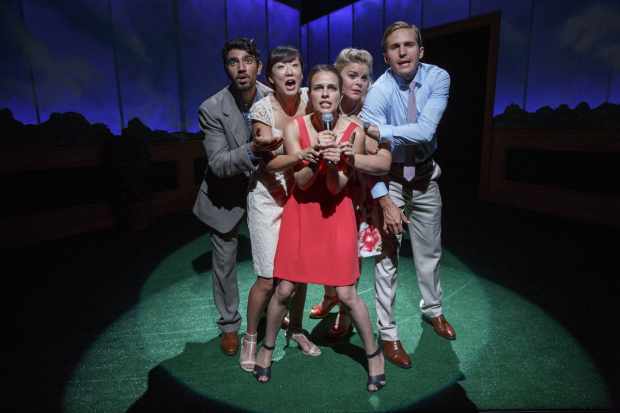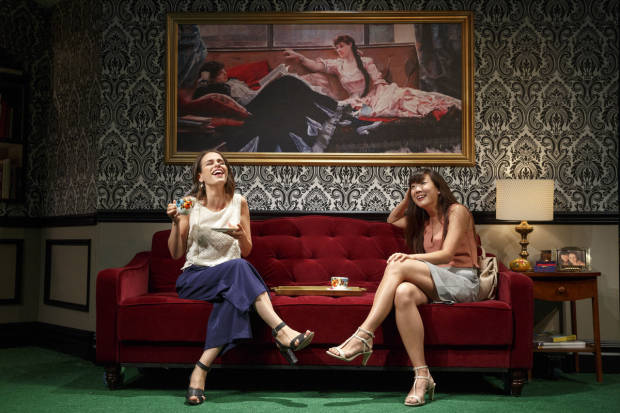
(© Joan Marcus)
Millennial anxiety reigns at Second Stage Theatre's uptown home, the McGinn/Cazale Theatre: Hot on the heels of Friend Art, Sofia Alvarez's play about the fading dreams of late twentysomethings, comes Engagements, Lucy Teitler's satire of the race to marry before you end up old and alone. It is a subject that Joshua Harmon tackles far more earnestly in the Broadway-bound Significant Other. Still, in her own naughty and playful way, Teitler seems to be having a lot more fun making the case that our present state is not nearly as exceptional as we would like to believe.
She treats us to a perfectly awful anti-heroine in Lauren (Ana Nogueira), a Ph.D. candidate in Victorian literature at an elite university near Boston. Lauren's best friend is the elegant Allison (Jennifer Kim). Allison is very much in love with Mark (Michael Stahl-David), but Lauren is decidedly not — in fact, she hates him. But at one particularly drunken engagement party (at this point in their lives, all they seem to do is attend engagement parties), Mark admits that he read Anthony Trollope's He Knew He Was Right to have something to talk to her about. As a result, Lauren decides to hook up with him in a gazebo. Should she tell her best friend about this betrayal? The guilt weighs on her, especially after Mark proposes marriage to Allison and Allison insists that Lauren be her maid of honor.
Much of Teitler's plot feels contrived, especially after Lauren's budding hipster of a cousin (Brooke Weisman) arrives with her boyfriend, Ryan (Omar Maskati), who also happens to be a Ph.D. candidate. "She's a Victorianist," he sneers. "I'm in comp lit! You realize those disciplines have nothing in common, right?" Protest though he might, Ryan easily transforms into a melodramatic Sherlock Holmes knockoff when he decides to solve the mystery of who keeps anonymously sending Lauren sex toys from Amazon.
There is something classical about Teitler's style, a trait that director Kimberly Senior takes full advantage of: The characters occasionally walk over to a stage-right microphone to deliver a soliloquy, working out their inner conflicts with the audience as they would in any play by Shakespeare. Naturally, the monologues of the lit majors are the most florid and overwrought, especially Ryan's (Maskati dives into his character with committed sincerity, understanding clearly that the funniest people take themselves very seriously). We can never quite tell if Teitler's art resembles life, or if we strive to make our lives resemble art.

(© Joan Marcus)
At one point, every character crowds around the mic, desperately trying to be heard above the din. They are all the stars of their own story, which is obviously the most interesting story in the whole world. This could be construed as a harsh critique of the vanity of the Facebook generation, but really: Are our banal bourgeois dramas any more insipid than those of the Victorians?
At very least, the Victorian authors were a lot more frank in discussing money, laying out in black and white the vast estates and predictable returns that allowed their characters to live a life of leisurely intrigue. Teitler is a lot more coy about money, but scenic designer Wilson Chin isn't: The jacquard wallpaper, shelves populated by first editions, and constantly changing vistas of Downton Abbey-esque manor homes let us know that these people are loaded. Beth Goldenberg's costumes achieve preppy realness, the one purposeful exception being Ryan, who wears a baggy three-piece suit (no tie) to the final garden party: "I think it sends a strong 'Break Up the Banks' message," he smugly observes.
During the transitions, the actors perform embarrassingly cheesy wedding dances, ritualized movements that, if you squint, look a lot like the English country dance one might see in a film adaptation of Vanity Fair. They electric-slide, goofy smiles plastered across their faces. It's amazing how much this very special day seems to look and sound exactly the same, no matter how many they attend.

(© Joan Marcus)
Engagements is a fascinating mess, overflowing with big ideas that are only half-conveyed. Formally, it cannot quite decide what it wants to be. By the second half, the plot seems to jump the tracks. Still, it is never boring. On top of that, by the end Teitler takes a loathsome protagonist and makes us actually like her (or at least understand her). Much of this has to do with the hilarious Nogueira, whose ultra-dry line-readings feel right on the money. Sure Lauren's terrible, but not any more than the people around her.











